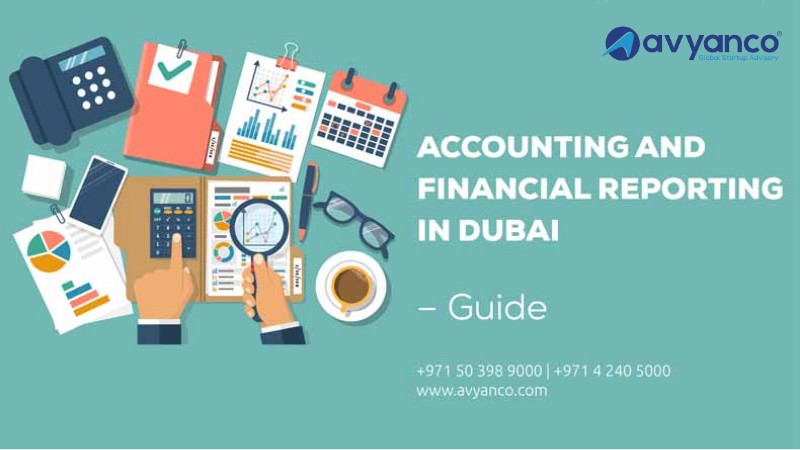You might be aware that having a detailed financial reporting process is important. This is because it’s a legal rule in most countries. But did you know that financial reporting in Dubai has even more untapped power and potential? Financial analysis is a crucial foundation for modern businesses. It can help businesses stay on top of their finances and make smart decisions about things like income and expenses.
This guide will help you understand the potential of accounting and financial reporting in Dubai. So let’s dive right in with a detailed definition.
What is Financial Reporting
When you’re running a business, it’s important to stay on top of your finances. Financial reporting is basically taking a closer look at your accounting process. This way, you can see how you’ve been doing in the past, how you’re doing now, and maybe even predict how things will go in the future. It’s like getting the big picture of your finances, so you can figure out what’s going well and what needs a little help.
Accounting and Financial Reporting in Dubai
Keeping track of a company’s finances is super important. It shows that you’re on top of things and have everything organized. Accounting makes sure that all the numbers and information are accurate and communicated even the non-financial stuff. But financial reporting takes accounting information and presents it in a clear and organized way. This financial reporting is helpful for the government, shareholders, and investors.
In the UAE, we follow the International Financial Reporting Standards (IFRS) accounting standards. It is a big deal and something every company needs to follow. Keeping track of finances and making sure everything is reported correctly is super important in Dubai. It helps keep everyone on the same page and following the rules.
Benefits of Financial Reporting
If you’re thinking about starting a business in Dubai, you should know that accounting and financial reporting systems offer some great advantages. They can help make your business more successful and stable overall. It helps improve debt management by allowing you to keep track of your assets and liabilities. It also enables you to effectively manage debts and maintain a healthy financial position. Moreover, financial reporting in Dubai facilitates trend identification. Using financial reporting, you can spot patterns and trends in your financial activities, both past and present.
Another advantage of financial reporting is real-time tracking. It provides you with access to timely insights that enable you to make accurate decisions swiftly. It also helps businesses effectively manage their liabilities. This ultimately assists in handling various financial obligations such as business loans, credit lines, credit cards, and vendor credit.
By keeping accurate records of your finances, you not only improve efficiency but also stay compliant with regulations. And we all know that compliance is key to keeping your business safe and secure. So keep up the good work and keep those financial reports accurate!
Difference between Financial Accounting and Financial Reporting
So, what’s the deal with financial reporting and accounting? Let’s break it down:
- Storing vs. analyzing: Accounting is all about generating and storing financial info, which will later be analyzed through financial reporting.
- Gathering information: Financial reporting collects all the information from accounting and compiles it in one place, making it easier to understand and analyze.
- Accounting rules: Financial accounting follows specific rules to ensure consistency and accuracy. If these rules aren’t followed, it can mess up calculations and lead to inaccurate financial reports.
- Forecasting: Financial reporting focuses on predicting future finances and influencing future spending. Accounting gathers the necessary info for this forecasting and analysis to happen down the line.
Now, let’s check out the objectives of each:
Accounting:
- Keeps a record of your business’s financial history.
- Provides a snapshot of your financial position.
- Presents financial information in an easy-to-understand layout.
Reporting:
- Predicts the financial future of your business.
- Analyzes and interprets the financial position of your company.
- Emphasizes cash flow and overall economic value.
What Accounting Standards are Followed in Dubai?
Businesses in the UAE, including those within the Dubai International Financial Centre (DIFC), follow the International Financial Reporting Standards (IFRS) for accounting services. Previously, in 2012, Islamic Financial Institutions (IFIs) operating under DIFC followed the Financial Accounting Standards (FAS) report. It was audited by the Accounting and Auditing Organization for Islamic Financial Institutions (AAOIFI). However, after a two-year transition period, IFRS has become the regulated accounting standard used across the UAE.
IFRS Reporting Components in UAE
International Financial Reporting Standards (IFRS) is a global standard for financial management tasks and activities.
IFRS guides accountants in handling specific events and transactions when preparing financial reports. It provides a comprehensive framework for accountants to maintain accurate records. The purpose of these guidelines is to establish a common language that is easily understood by businesses and accounting firms.
Under the IFRS, management prepares financial statements using the accrual basis of accounting. In the UAE, the following components are included in IFRS financial reporting:
- Balance Sheet: It is a snapshot of the company’s financial position, showing assets, liabilities, and equity at a specific point in time.
- Income Statement: It summarizes the company’s revenues, expenses, gains, and losses over a particular period.
- Cash Flow Statement: it highlights the inflows and outflows of cash and cash equivalents during a given period.
- Equity Statement: This provides details on changes in equity, including contributions, distributions, and retained earnings.
Types of Financial Reporting in Dubai
There are seven types of financial reports that provide valuable insights. Let’s take a casual look at them:
- Financial Statements:
This report has all the important financial stuff – like how much money we made (income statement), what we own and owe (balance sheet), how much cash we have (statement of cash flow), and how much ownership is held by shareholders (shareholder equity). They’re essential reports required for statutory audits in the UAE.
- Board of Directors Report:
When companies want to show how they’re doing, they use a report that looks at the performance of everyone in charge. It’s a way to get a good idea of what’s working and what needs to change.
- Management Decisions & Analysis Report:
This report tells the company’s previous choices, what they’ve found out from market research, and how they stack up against their competitors.
- Audit Report:
The audit companies in Dubai make sure to follow the government’s guidelines to stay in compliance. It’s just part of doing business in Dubai! These independent reports operate under the regulations of the Supreme Audit Institution (SAI).
- Corporate Governance Report:
This report holds companies accountable for their decisions, employees, and management. It helps them stay in line with accounting and auditing standards, so everything stays fair and transparent.
- Notes to Accounts:
This report gives more details on how the company handles its accounting policies and procedures. This information is included in internal or external audit reports.
- Prospectus:
It is basically a report that breaks down all the financial info for investors, shareholders, and stakeholders. It’s important for them to have all the details, so the prospectus makes it easy to understand what’s going on with the company’s finances.
How Avyanco Chartered Accountants can help you
When it comes to financial reporting, it’s important to be upfront and honest about how the company handles its accounting. It helps make sure the right people can identify and prevent fraud in managing the finances of the company.
With all the changes happening in tax and federal regulations, financial reporting here in the UAE is getting complex. However, strict guidelines ensure accountability from companies. This is when Avyanco comes into play!
If you’re looking for a great auditing firm in Dubai, you should definitely check out Avyanco. We have tons of experience helping clients with their financial reporting and accounting needs all across the UAE. We provide our clients with vital insights and assist companies in managing potential risks when it comes to their finances.
Avyanco has a competent team who knows its stuff when it comes to auditing and accounting. We’re dedicated to delivering top-notch work.
So if you’re looking for high-quality work, Avyanco’s definitely the way to go!



